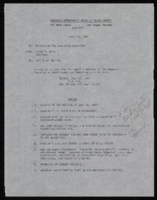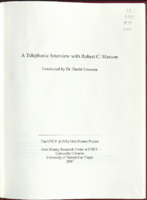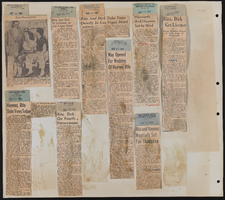Search the Special Collections and Archives Portal
Search Results

Economic Opportunity Board of Clark County (Nev.): memos, agendas, and meeting minutes
Date
Archival Collection
Description
From the Clark County Economic Opportunity Board Records -- Series I. Administrative. This folder contains memos, agendas and minutes from meetings of the Clark County Economic Opportunity Board from July 1967 through December 1967.
Text

Su Kim oral history interview: transcript
Date
Archival Collection
Description
Oral history interview with Su Kim conducted by Ashley Brooke Fuentes on November 21, 2021 for Reflections: The Las Vegas Asian American and Pacific Islander Oral History Project. In this interview, Su Kim discusses her family and life in Seoul, Korea. She talks about immigrating alone to the United States to study in Provo, Utah and later transferring to the College of Southern Nevada. Su Kim talks about her immigration experience, the culture shock of coming to America, and the discrimination and racism she has seen since the start of the COVID-19 pandemic. Su shares how she met her husband, details of her employment as an office manager, and her plans to pursue a degree in hospitality from the University of Nevada, Las Vegas.
Text

Transcript of interview with Arby Hambric by Claytee D. White, September 23, 2015
Date
Archival Collection
Description
Arby L. Hambric's book entitled, "To Thee I See: From picking in the fields of Texas to cooking for dignitaries on U.S. Navy ships, a journey I wouldn't change," describes his profound journey from working in the cotton fields as a child to being drafted into the U.S. Navy, before completing high school. During this interview, he recalls the significant achievements of the "Red Tails" and the Tuskegee Airmen. Beginning his 20 year Navy career before military integration, Arby describes the racial tensions that plagued the U.S. Navy in the 1940s, and discusses how he was able to successfully navigate that racist environment for two decades and three war eras. Arby enrolled in San Diego State College after leaving the U.S. Navy. He also worked as maintenance personnel for Sears and Roebuck and started a catering business with his wife. He became a member of the Southern Nevada Enterprise Community, SNEC Board upon moving to Las Vegas, Nevada, after his wife died. With a family legacy he can be proud of, Arby highlights the achievements of his great grandson Taquan Mizzell, a Virginia Cavaliers running back at the University of Virginia. As a Navy veteran, Arby often volunteered his time and resources to help others in need. He recalls driving the sick and elderly back and forth from the Westside community to Valley Hospital or University Medical Center, UMC. He also discusses government enforced road closures and a wall that was built to block Blacks from entering the new downtown. This interview sheds new light on military integration and offers key strategies for overcoming environmental racism. Arby mentions a documentary about the closing of the wall and offers his predictions on the future of the Westside.
Text

Interview with Lewis Gibson Miller, September 14, 2005
Date
Archival Collection
Description
Text

Interview with William Byron Beam, January 20, 2005
Date
Archival Collection
Description
Text

Domingo Cambeiro oral history interview: transcript
Date
Archival Collection
Description
Oral history interview with Domingo Cambeiro conducted by Stefani Evans and Claytee D. White on October 18, 2016 for the Building Las Vegas Oral History Project. In this interview, Cambeiro discusses his upbringing in Havana, Cuba. He talks about his initial interests in architecture, starting his own architecture drawing service, and attending the University of Havana. Cambeiro recalls submitting a request to leave Cuba, emigrating to the United States, and arriving in Las Vegas, Nevada in 1962. Cambeiro talks about working with Las Vegas architect Julius Gabriel, obtaining his architecture license, and starting an architectural firm. Lastly, Cambeiro discusses being selected to create architectural drawings for the Thomas & Mack Center.
Text

Transcript of interview with William Morgan by David G. Schwartz, October 21, 2016
Date
Archival Collection
Description
Text

Transcript of interview with Robert C. Maxson by Dr. David Emerson, May 15, 2007
Date
Archival Collection
Description
Text


